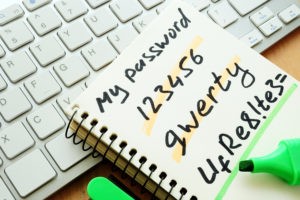
With most bank customers receiving financial statements electronically instead of on paper, there are some actions you need to take to be sure your online accounts are incorporated into your estate planning.
Kiplinger’s recent story, “Your Estate Plan Isn’t Complete Without Fixing the Password Problem,” says that having online access to investments is a great convenience for us. We can monitor bank balances, conduct stock trades, transfer funds and many other services that not long ago required the help of another person.
The bad thing about these advancements, is that they can make for a very difficult situation for a surviving spouse, the executor of your estate, or the successor trustee of your living trust, attempting to determine where the assets of a deceased person are held.
This was in the news recently, when the founder and CEO of a cryptocurrency exchange died unexpectedly. Gerry Cotten didn’t share the password to the exchange’s cold storage locker—leaving $190 million in cryptocurrency belonging to his clients totally inaccessible. Investors may never see their funds again.
You can see how important it is that your estate plan provides a way for someone to access your online data, if you become incapacitated or die. This is also true for your other digital assets such as email and social media accounts. It can be a heart breaking situation for a family who wants to access photos and other online memories left behind by a deceased loved one if they are unable to do so because they don’t know the passwords.
The easiest, but least secure, answer is to just give your passwords to a trusted family member or the person you have appointed as executor of your estate or successor trustee of your living trust. Remember, they’ll need the passwords to access your online accounts. They’ll also need a password to access your email, where electronic financial statements are sent.
Another option is to write down and place all passwords in a safe deposit box. But you’ll need to let your agent under a power of attorney, the executor of your estate, or the successor trustee of your living trust, know that the passwords are in your safety deposit box so that they may take steps to access them in the event you are deceased or incapacitated.
But the problem with storing your passwords in a safety deposit box is that it requires diligence to keep the password list updated.
Another option to consider is a password manager, which is an app that keeps track of all your passwords across all your devices. With a password manager, you, or anyone who needs to have access to your passwords, will only need to know one password that, when used, will give access to all your other passwords. That one password may be kept in a safety deposit box, a safe at your home, a locked file drawer, or any other secure location. You should share the password, or the location of the password, with the trusted people who will handle your affairs if you should become incapacitated and after you die.
Finally, your estate planning documents should include provisions that authorize your agent under a power of attorney, the executor of your estate, or the successor trustee of your living trust, to access and manage your social media and online accounts.
Reference: Kiplinger (April 19, 2019) “Your Estate Plan Isn’t Complete Without Fixing the Password Problem”
Suggested Key Terms: